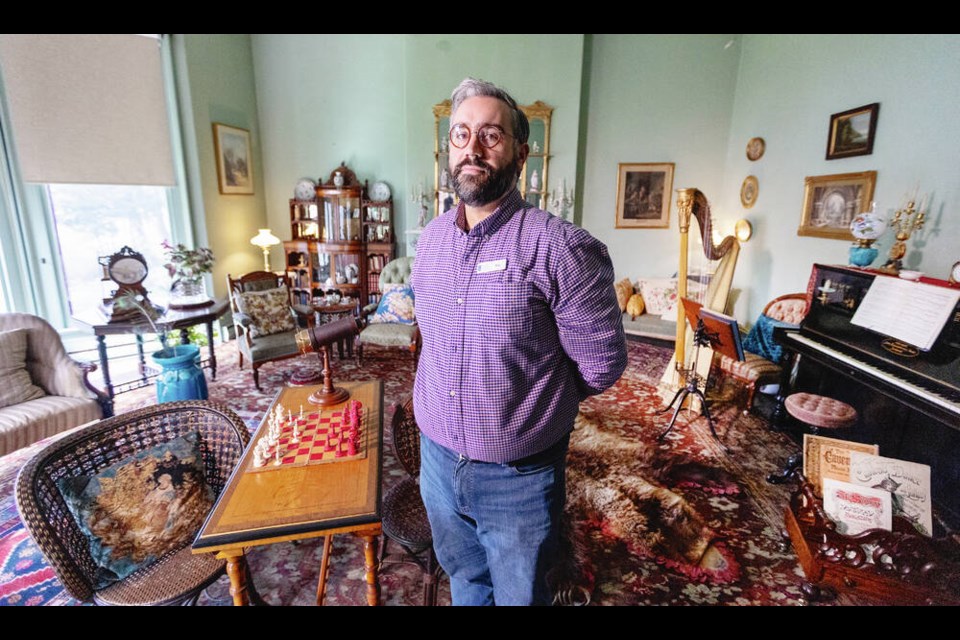Wednesday’s sudden closing of the Point Ellice House Museum and Gardens was not, in fact, sudden.
The operators of the Victoria heritage gem had warned for years that they would have to pull the plug if the province didn’t provide sustainable funding.
The big question now is: Will other publicly owned historical properties follow?
“We’re the first to close. There are likely to be others,” says Kelly Black, the executive director of the latest non-profit group to try, and fail, to keep Point Ellice House going.
Just look at what is happening around us, Black says. The third floor of the Royal B.C. Museum remains closed. The Bateman Gallery just pulled the plug on its Inner Harbour location. Barkerville, the jewel of the Cariboo, has struggled. “It’s not looking good for B.C.’s museums and heritage sites right now.”
The government, though, argues that it has made significant investments in Point Ellice House. It also says heritage-site operators’ requests for more money “must be considered in light of other heritage sites that British Columbians would like the province to also fund and protect.”
The province says it will, once Black’s group makes its decision official, look for a new operator and for ways to keep the site accessible to the public.
In some ways, the roots of Point Ellice’s problem can be traced to 2002, when Gordon Campbell’s new Liberal government decided to contract out the operation of a dozen B.C. Heritage Branch sites, including four in Victoria.
Agreements were soon reached to run the capital’s other three. The Royal B.C. Museum was a natural fit to take on neighbouring Helmcken House, while operators were also found for Emily Carr House and Craigflower Manor.
Point Ellice House was a tougher challenge, due largely to its location in the Rock Bay industrial area, where it was like a lone rose bush clinging to the edge of the junkyard. Many Victorians didn’t even know it was there. Yet in 1975 the property — the rambling Italianate house, two acres of heritage gardens and Western Canada’s largest collection of Victoriana — was deemed important enough for the province to take possession of it as a heritage site.
It had come to prominence after gold rush commissioner Peter O’Reilly bought the property in 1867. The centre of Victoria’s social scene, it once hosted the likes of explorer Robert F. Scott, who, before gaining fame as Scott of the Antarctic, would drop by for dinner, tennis or horseback riding when his Royal Navy ship dropped anchor.
There are bearskin rugs, 14-foot ceilings, 20-foot hollyhocks and heritage trees that include beech, linden and a sequoia planted by O’Reilly in 1876.
It’s also where, amid all this old-world loveliness, O’Reilly, as Indian reserve commissioner, more or less arbitrarily drew the lines that dispossessed Indigenous people, changing the course of history.
In 2002, though, no non-profit was clamouring to take over operations. Finally, in 2004, the Capital Mental Health Association, seeing an opportunity to offer clients pre-employment training, stepped up, offering tea and tours. The economics didn’t work, though. After the CMHA bowed out, the Point Ellice House Preservation Society emerged in 2009, but couldn’t make a go of it, either. Next up, in 2019, came the Vancouver Island Local History Society, whose volunteers acted as docents, researchers and gardeners (the food they grew went to a women’s shelter and others in need).
When the pandemic closed the house and grounds in 2020, the challenge grew, not just for Point Ellice House but other heritage sites, too. In 2021, the operators of five of them — Carr House, the gold rush town of Barkerville, Yale Historic Site, Kilby Historic Site in Harrison Mills and Hat Creek Ranch near Cache Creek — warned the government that they were on the brink, couldn’t keep going without sustainable funding.
Black says he gave the same message to the current minister responsible, Lana Popham, and Victoria MLAs Rob Fleming and Grace Lore when he toured them around the property in February.
The same pleas failed to move the needle at a Tuesday meeting with the Heritage Branch. So, on Wednesday, the Vancouver Island Local History Society announced on social media that it was closing the doors, effective immediately.
“We weren’t bluffing,” Black says.
The current model just doesn’t work, he says. “We’re the third not-for-profit to hand the keys back to the province.”
Running the place sustainably would cost $325,000 a year, he says. The government budgeted $110,000 for operations for the coming year. The gift shop and admission fees don’t come close to narrowing the gap. “The costs are way more than we are able to bring in, in revenue.”
The Ministry of Tourism, Arts, Culture and Sport says it has paid a lot since 2019: a total of $425,000 for site operations, $338,000 for site maintenance and a one-time $226,000 grant through the B.C. 150 Time Immemorial program.
It says it has not yet been officially notified by the society that it is stepping away from its contract, which runs until 2024.
“If the province receives official notice that Point Ellice’s operator would like to leave the contract, we will follow a process to find a new operator, which will take an estimated two to three months. During that time, we would look for options to maintain public access and maintain security of the site.”
OK, but if three operators haven’t made it work, how will a fourth do so?
>>> To comment on this article, write a letter to the editor: [email protected]



